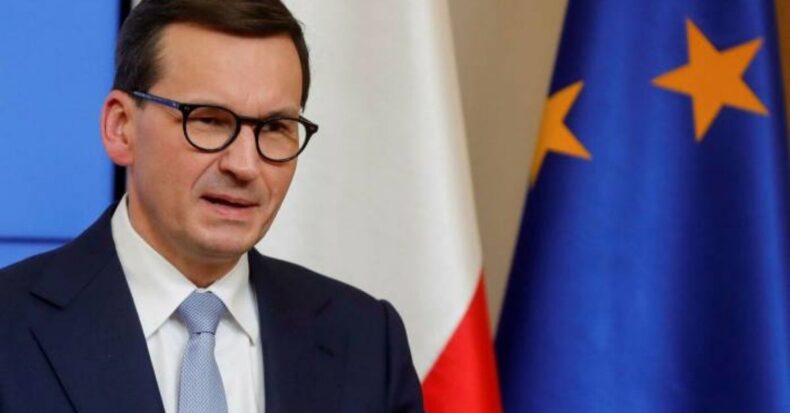Polish Prime Minister Mateusz Morawiecki has accused the EU of making demands of Warsaw with a “gun to our head”.
According to the top court of Poland, EU laws are incompatible with its constitution, and as a result, the country has been threatened with sanctions by the European Commission.
Disagreements between Poland and the European Union has taken a new turn, with Polish Prime Minister Mateusz Morawiecki accusing the EU of making demands of Warsaw with a “gun to our head”.
With the EU wanting to resolve Poland’s rule of law crisis, Morawiecki has also urged them to withdraw threats of legal and financial sanctions.
Fears of a Polish exit from the EU are at an all-time high. However, the Polish PM attempted to ease tensions in the dispute with a promise to dismantle a disciplinary chamber of judges that the European Court of Justice found illegal by year-end.
Morawiecki has warned that if the European Commission withholds promised cash to Warsaw, he would “defend our rights with any weapons which are at our disposal”.
According to the top court of Poland, EU laws are incompatible with its constitution, and as a result, the country has been threatened with sanctions by the European Commission.
This ruling has resulted in an escalation in a long-running legal battle over changes to the court system in Poland that Morawiecki’s Law and Justice party says are required for increased efficiency.
The EU believes that these changes to the Polish court system threaten judicial independence and the fundamental legal bonds that hold the EU together.
“What is going to happen if the European Commission will start the third world war? If they start the third world war, we are going to defend our rights with any weapons which are at our disposal,” said Morawiecki when asked if Poland could veto critical decisions on legislation such as the EU’s landmark climate package.
He added, “We feel that this is an already discriminatory and a diktat type of approach [from Brussels]. But if this is going to be even worse, we will have to think through our strategy.”
HISTORY OF POLAND AND THE EU
Poland joined the European Union in 2005. In the year 2015, Poland’s internal policies became a subject of controversy within the EU.
On 13 January 2016, Poland launched a formal assessment of the rule of law based on rules laid out in 2014 regarding the amendment of the constitutional court and public media law in Poland, which could, theoretically, lead to Poland being stripped of its voting rights in the EU.
According to the Polish Constitutional Tribunal, interim measures from the top European court against Poland’s judicial reforms did not align with the constitution of Poland.
This was ruled in July 2021, and the Polish justice minister said that the constitutional court’s decision was “against interference, usurpation and legal aggression by organs of the European Union”.
Poland opened a new conflict with the European Union when on 7 October 2021, Polish Constitutional Court ruled that parts of the Treaty on the European Union were incompatible with its constitution.
POLISH PM VS EU CHIEF
During a heated debate with EU lawmakers just a few days ago, European Commission President Ursula von der Leyen and Mateusz Morawiecki opened up their differences of opinion regarding rule-of-law principles.
Ms von der Leyen has accused Mr Morawiecki of running away from discussions regarding the importance of European law. In contrast, the Polish PM has emphasized that Poles favour the “power of the rule of law” and “don’t believe in blackmail or paternalistic attitudes” toward their country.
The rocky relations between the EU and Poland reached another low after the tribunal ruled that Polish laws take precedence over the EU’s. This has led to escalating tensions between Poland’s right-wing nationalist government and EU institutions.
The main issue lies in who should have the most power within the EU – individual nations over their citizens or the EU over its member nations. This has been the prime reason that pushed Britain out of the EU, and it has also ignited passions in other EU countries such as Hungary and Poland.













